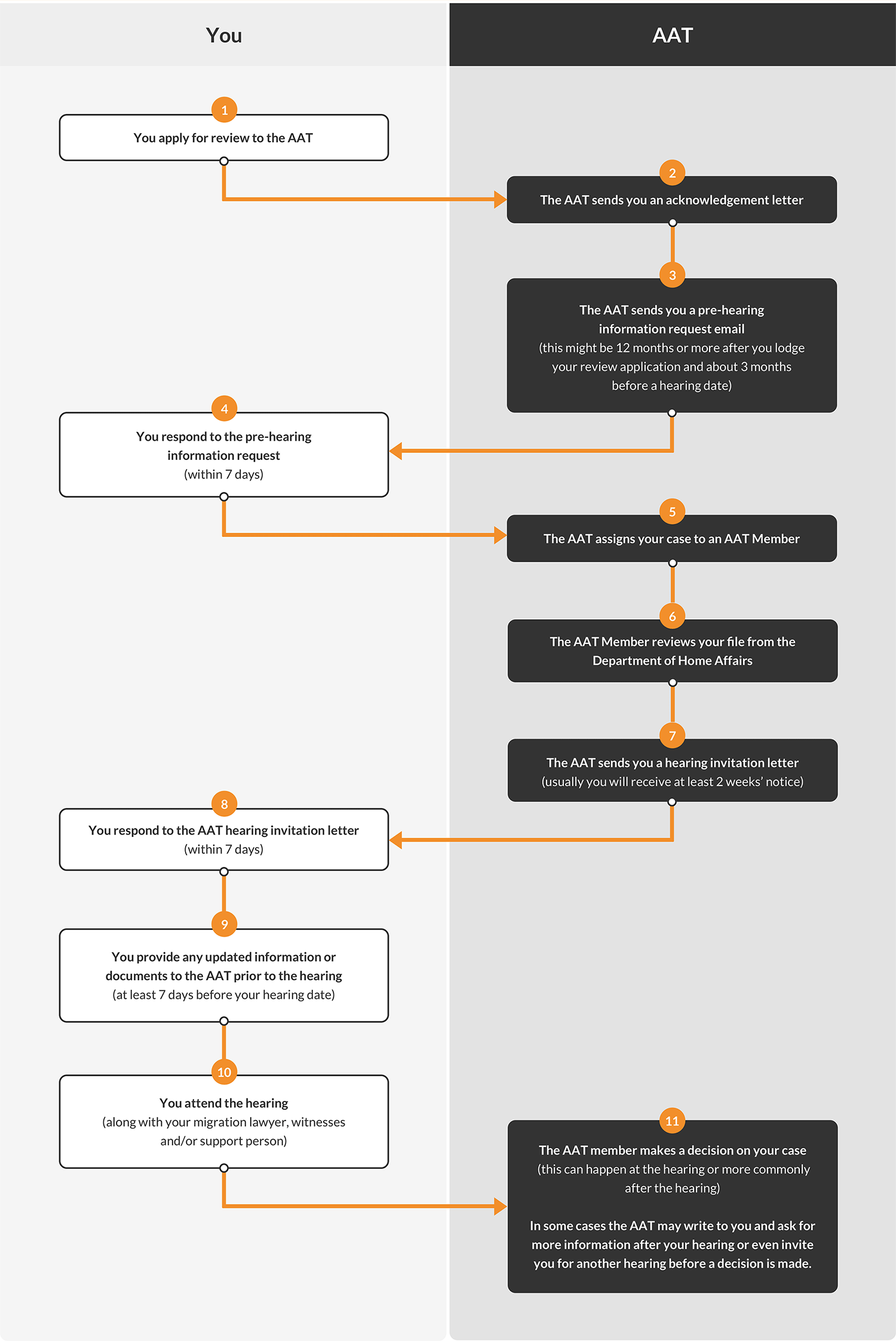Here we have outlined 4 simple steps to follow to ensure you are prepared for your hearing:
The AAT hearing is an important opportunity to explain your circumstances in person and the reasons why you disagree with your migration decision. It is also a chance for the AAT to ask you questions and get a better understanding of your appeal.
-
Take a deep breath
The first step, take a deep breath. You may have been waiting a long time for your hearing and now that you have a date you may be feeling stressed. This is a very normal response and it is important that you don’t ignore the AAT hearing invitation letter. You now have an opportunity to get prepared and put forward your best case.
Handy hint: Don’t put off taking action on your case now you have your AAT invitation letter. Some people come to us just a day or two before the hearing because they have felt too worried about what to do next. This is a common response but one that won’t help you to put your best foot forward. -
Read the AAT hearing invitation letter carefully
The important things to look out for are:
- The date and time of your hearing
- The location of your hearing (is it in person or by video link?)
- Whether an interpreter has been arranged (if you need an interpreter, make sure the correct language has been listed or contact the AAT as soon as possible to advise them you need one)
- The names of the people who need to attend the hearing (generally the main applicant and your legal representative)
- If the AAT has listed any particular evidence or documents that it wants you to provide
- The deadline to give any new information or documents to the AAT
Handy hint: The AAT requires the hearing invitation letter to be completed and returned within 7 days. Generally we recommend that your migration lawyer completes this form for you to ensure all the information included is consistent with your case and meets the requirements of the AAT. It is also important your witnesses understand the hearing process and what might be required of them. -
Speak to a migration lawyer
It is not mandatory to have a migration lawyer attend your AAT hearing but it may give your case the best chance of success if you do. Migration appeals can be complex and involve a strong understanding of the migration laws that impact your situation. They can also bring a lot of stress with them.
At WLW our migration lawyers will:
- Respond to the AAT hearing invitation letter
- Request and review your immigration file through Freedom of Information (if relevant)
- Explain the best strategy or response to the Department of Home Affairs’ decision
- Assist you to prepare a statement outlining your explanation of different aspects of your case
- Explain any other evidence that may be needed, such as medical reports or letters of support
- Assist you to obtain any medical reports (if relevant)
- Prepare a legal submission outlining the legal reasons why your case should be successful (referring to visa criteria and caselaw)
- Prepare you for the AAT hearing
- Attend the AAT hearing with you
- Provide oral submissions at the hearing explaining why your case should be successful
Handy hint: It is important that you have good communication with your migration lawyer and understand the steps involved in your case. If in doubt, ask what the strategy is and the types of documents or information you can gather to help your case. -
Finalise your AAT appeal material
An AAT hearing is an important opportunity to tell your story in detail and address any issues that you may have found in the Departmental visa refusal decision. It is important to be well prepared for the hearing, to have supportive evidence and to ensure all the legal criteria are met in order to have a successful appeal.
In order to be well prepared you should understand the reasons why your visa application was refused or your visa was cancelled by the Department of Home Affairs. If you are not clear on the reasons then carefully read the Department of Home Affairs decision. There may be one or more reasons that you were not granted a visa.
The best strategy for your AAT appeal will depend on your individual circumstances and the reasons given in the decision. Often the best strategy can involve:
- Preparing a statement outlining your explanation of different aspects of your case
- Obtaining supporting evidence such as medical reports or letters of support
- Identifying people who could be witnesses to support different aspects of your case
- Doing legal research to explain why your case should win at the AAT and providing the AAT with a legal submission
Handy hint: It is important that the AAT appeal material (information and documents) are submitted to the AAT by the deadline included in your AAT hearing invitation letter. Generally this is at least 7 days before the AAT hearing date. This will allow the AAT time to review the material and it generally makes your hearing much smoother.
Most AAT Migration and Refugee Division matters follow the same process.


Our migration lawyers are experts at AAT appeals and are available to guide you through this process. Book a free 15 minute phone call here.
Our Immigration Law Team
WLW Migration Lawyers is an award-winning specialist immigration law firm, led by Jessica Williamson, James Wardlaw and Simon Leske along with a team of skillful and compassionate lawyers and support staff.


